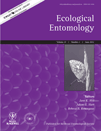
ECOLOGICAL ENTOMOLOGY
Scope & Guideline
Exploring the Intricacies of Insect Ecology
Introduction
Aims and Scopes
- Ecological Interactions:
Research often centers on the ecological roles of insects within various ecosystems, including their interactions with plants, other insects, and their environments. - Evolutionary Biology:
The journal publishes studies exploring evolutionary adaptations of insects to their environments, including co-evolution with host plants and other species. - Biodiversity and Conservation:
A significant focus is on the biodiversity of insect species, the impact of environmental changes on their populations, and strategies for conservation. - Functional Ecology:
This includes studies on the functional roles of insects in ecosystems, such as pollination, decomposition, and trophic interactions. - Applied Entomology:
Research related to applied aspects of entomology, including pest management and the ecological impacts of invasive species.
Trending and Emerging
- Climate Change Effects:
There is an increasing emphasis on how climate change impacts insect populations and community dynamics, including studies on thermal tolerance and phenological shifts. - Insect-Plant Interactions:
Research exploring the intricate relationships between insects and their host plants, particularly in the context of changing environmental conditions, is gaining traction. - Microbiome Research:
The role of microbial communities in insect health and ecology is an emerging field, with studies investigating how these relationships affect insect performance and interactions. - Citizen Science and Public Engagement:
A trend towards incorporating citizen science initiatives in entomological research, allowing broader public participation in data collection and increasing awareness of insect conservation. - Functional Traits and Ecosystem Services:
There is a growing focus on understanding functional traits of insects and their contributions to ecosystem services, linking insect ecology more closely to conservation efforts.
Declining or Waning
- Traditional Taxonomy:
There appears to be a waning interest in purely taxonomic studies without ecological or evolutionary context, as more emphasis is placed on integrative approaches that combine taxonomy with ecological function. - Laboratory-Based Studies:
Research focusing solely on laboratory conditions is declining; there is a growing preference for field studies that incorporate real-world complexities. - Single Species Focus:
Studies that concentrate on a single insect species without considering broader ecological implications are becoming less common, as the journal trends towards multi-species interactions and community ecology. - Historical Ecology:
Research that primarily investigates historical distributions or past ecological conditions without current relevance is less frequently published.
Similar Journals

REVISTA DE LA SOCIEDAD ENTOMOLOGICA ARGENTINA
Advancing Insect Science Through Open Access ResearchREVISTA DE LA SOCIEDAD ENTOMOLOGICA ARGENTINA is an esteemed open-access journal dedicated to the field of entomology, published by the SOCIEDAD ENTOMOLOGICA ARGENTINA. Since its transition to open access in 2013, the journal has sought to promote research in insect science, ecology, and related disciplines, facilitating global dissemination of knowledge and encouraging collaborative studies across borders. Located in the vibrant scientific landscape of La Plata, Argentina, the journal is indexed in Scopus and categorized in the fourth quartile of ecology and insect science, reflecting its commitment to enhancing the discourse within these critical fields. Aiming to bridge the gap between researchers, students, and professionals, REVISTA DE LA SOCIEDAD ENTOMOLOGICA ARGENTINA serves as a platform for innovative research, reviews, and reports on ecological interactions, behavior, and systematic entomology, ultimately driving forward our understanding of insect biodiversity and its broader environmental impacts.
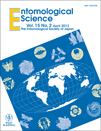
ENTOMOLOGICAL SCIENCE
Connecting Science and Nature through EntomologyENTOMOLOGICAL SCIENCE, published by WILEY, stands at the forefront of research in the field of entomology, focusing on the intricate relationships between insects and their environments. With its ISSN 1343-8786 and E-ISSN 1479-8298, this esteemed journal, based in the United States, has been serving the scientific community since 2005. As a Q3 journal in both Ecology, Evolution, Behavior and Systematics and Insect Science, it presents vital peer-reviewed articles that advance our understanding of insects and their ecosystems. With a Scopus rank of 85/181 in Insect Science, the journal not only reinforces the importance of insect study but also serves as an essential resource for researchers and professionals seeking to explore and disseminate knowledge in this dynamic field. Although it does not offer Open Access options, its scholarly contributions are invaluable for those invested in ecological research and entomological perspectives—making it a must-read for aspiring and established scientists alike.

INSECTES SOCIAUX
Pioneering research in insect science and ecology.INSECTES SOCIAUX, published by SPRINGER BASEL AG, is a prestigious international journal established in 1954, dedicated to advancing the field of insect science and ecology. With a robust ISSN of 0020-1812 and an E-ISSN of 1420-9098, INSECTES SOCIAUX maintains a significant impact within its category, boasting a Q2 ranking in both Ecology, Evolution, Behavior and Systematics and Insect Science. This journal serves as a vital platform for researchers and professionals looking to publish high-quality research that enhances our understanding of social insects, their behaviors, interactions, and ecological roles. Despite not being open access, INSECTES SOCIAUX remains a valuable resource, ensuring that critical scientific findings reach the broader academic community. With a comprehensive scope that merges diverse aspects of insect studies, this journal is essential for those engaged in ecological research and insect biology, facilitating an invaluable exchange of knowledge from its headquarters in Basel, Switzerland.
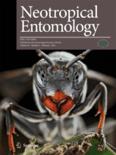
NEOTROPICAL ENTOMOLOGY
Celebrating the Ecological Wonders of Insect LifeNEOTROPICAL ENTOMOLOGY, published by the Entomological Society of Brazil, is a leading journal in the field of Insect Science, recognized for its significant contributions to the understanding of entomological research within the Neotropical region. With an impact factor placing it in the Q2 category and ranked #52 out of 181 in the Scopus rankings for Agricultural and Biological Sciences, this journal provides a vital platform for both seasoned researchers and emerging scholars to publish their innovative findings. Covering a broad scope of topics related to entomology, NEOTROPICAL ENTOMOLOGY aims to highlight the unique biodiversity and ecological significance of insects, fostering further appreciation and study within this crucial area of life sciences. The journal is available in both print (ISSN: 1519-566X) and online (E-ISSN: 1678-8052), ensuring accessibility to a wide audience and enhancing the dissemination of knowledge. As it converges towards its 2024 volume, the journal remains committed to advancing the scientific understanding of insect life in the tropics, making it an essential resource for researchers, professionals, and students alike.
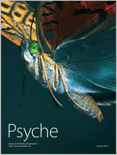
Psyche-A Journal of Entomology
Exploring the Intricacies of Insect LifePsyche-A Journal of Entomology is a distinguished open-access journal published by Hindawi Ltd, specializing in the field of entomology, including aspects of ecology, evolution, behavior, and systematics of insects. Established in 1874, this journal has a rich history of contributing to the scientific community by disseminating high-quality research related to insects and their diverse interactions within ecosystems. With an impact factor placing it in Q3 for both Ecology, Evolution, Behavior and Systematics and Insect Science, Psyche serves as a pivotal platform for researchers, professionals, and students aiming to deepen their understanding of insect-related science. The journal's commitment to open access ensures that research is accessible to a global audience, promoting collaboration and innovation in entomological studies. Covering a broad timeline of converged years from 1874 to 2024, Psyche fosters a comprehensive dialogue around insect biodiversity, conservation, and the ever-evolving dynamics of ecosystems in which insects play crucial roles.

ACTA ENTOMOLOGICA MUSEI NATIONALIS PRAGAE
Advancing Knowledge in Entomological ScienceACTA ENTOMOLOGICA MUSEI NATIONALIS PRAGAE, published by the esteemed NARODNI MUZEUM - PRIRODOVECKE MUZEUM in the Czech Republic, is an influential journal in the fields of Ecology, Evolution, Behavior and Systematics, as well as Insect Science. With an ISSN of 0374-1036 and an E-ISSN of 1804-6487, this journal has established itself as a vital resource for researchers, professionals, and students interested in the intricate world of entomology. Spanning publications from 2005 to 2024, it is recognized for its contributions to the understanding of insect biology, offering insights on ecological interactions and evolutionary relationships. Although it operates as a subscription-based platform, the journal maintains a respectable presence in scholarly circles, positioned in the Q2 quartile for both relevant categories in 2023. ACTA ENTOMOLOGICA serves not only as a repository of significant empirical findings but also as a discourse platform for emerging entomological concepts, making it an essential read for those involved in the biological sciences.
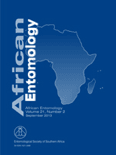
AFRICAN ENTOMOLOGY
Diving Deep into Africa's Entomological RichesAFRICAN ENTOMOLOGY, published by the Entomological Society of Southern Africa, is a pivotal journal dedicated to the vibrant field of entomology and its related disciplines. With an ISSN of 1021-3589 and an E-ISSN of 2254-8854, it serves as an essential resource for researchers, professionals, and students interested in the intricacies of insect science across diverse ecological and agricultural landscapes. This journal, with a convergence of publications from 1994 to 2024, holds notable rankings, notably placing in Q2 for Agronomy and Crop Science and Q3 for both Ecology, Evolution, Behavior and Systematics and Insect Science as of 2023. The journal has made significant contributions to the knowledge and understanding of insect populations, their behaviors, and interactions within ecosystems, making it highly relevant for those engaged in agricultural practices and biodiversity conservation. AFRICAN ENTOMOLOGY welcomes original research articles, reviews, and special issues that broaden the dialogue surrounding entomological studies, and while it operates under conventional access policies, it remains an influential platform for scholarly discourse in Southern Africa and beyond.
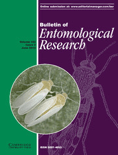
BULLETIN OF ENTOMOLOGICAL RESEARCH
Pioneering Research at the Nexus of Entomology and HealthBULLETIN OF ENTOMOLOGICAL RESEARCH, published by Cambridge University Press, is a prestigious journal that has been at the forefront of entomological research since its inception in 1910. With an impressive track record extending through to 2024, this journal serves as a vital platform for advancing knowledge in various related fields, notably Agronomy and Crop Science and Insect Science, where it ranks in the top quartile (Q2) and maintains a commendable position within the Scopus rankings in its categories. Notably, its contributions also intersect with Medicine in a broader scope, fostering interdisciplinary insights. While access to the journal content is not classified as 'Open Access,' its rigorous peer-reviewed articles are crucial for researchers, professionals, and students seeking to enhance their understanding of entomology and its applications in agronomy and beyond. The journal's impact is reflected in its notable percentile rankings, emphasizing its relevance and influence in the academic community. Located at the heart of the UK, the BULLETIN OF ENTOMOLOGICAL RESEARCH continues to be an essential resource for those dedicated to the study and understanding of insects and their impacts on agriculture and health.
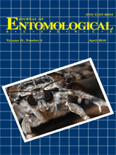
JOURNAL OF ENTOMOLOGICAL SCIENCE
Your Gateway to Cutting-Edge Insect StudiesJOURNAL OF ENTOMOLOGICAL SCIENCE, published by the Georgia Entomological Society Inc, is a crucial resource in the field of insect science and ecology. With a rich history since its inception in 1993, the journal provides a platform for innovative research and comprehensive reviews addressing various aspects of entomology. Although not an open-access journal, it is highly regarded within its community, holding a Q3 ranking in Agronomy and Crop Science, Ecology, Evolution, Behavior and Systematics, and Insect Science as of 2023. Each issue promises to contribute valuable insights to professionals, researchers, and students alike, making it an essential publication for those looking to stay abreast of developments in entomological studies. The journal's editorial commitment ensures that it remains at the forefront of entomological research through rigorous peer reviews and a dedication to scholarly excellence.

EUROPEAN JOURNAL OF ENTOMOLOGY
Bridging academia and industry in entomology.The European Journal of Entomology, published by the Czech Academy of Sciences, Institute of Entomology, is a pivotal journal in the field of Insect Science. With a solid impact factor and recognized ranking—placed in the Q2 quartile in 2023, and ranked #72 out of 181—this journal offers a platform for researchers and professionals alike to share insightful studies and advancements in entomological research. Since its inception in 1993, the journal has continuously evolved to cover a wide spectrum of entomological disciplines, establishing itself as an essential resource for academia and industry. Although it operates on a subscription basis, the journal ensures accessibility for a broad audience of scholars, students, and enthusiasts eager to stay at the forefront of entomological science. Located in Ceske Budejovice, Czech Republic, this journal not only highlights European contributions but also embraces global perspectives, making it an indispensable reference point in the ongoing exploration of insect biology and ecology.